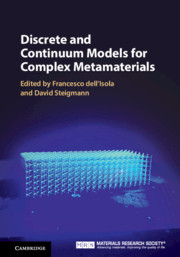Book contents
- Frontmatter
- Contents
- List of Contributors
- Part I Designing Complex (Meta)Materials: Results and Perspectives
- 1 Metamaterials: What Is Out There and What Is about to Come
- 2 A Review of Some Selected Examples of Mechanical and Acoustic Metamaterials
- 3 Pantographic Metamaterial: A (Not So) Particular Case
- Part II Mathematical and Numerical Methods
- Index
3 - Pantographic Metamaterial: A (Not So) Particular Case
from Part I - Designing Complex (Meta)Materials: Results and Perspectives
Published online by Cambridge University Press: 20 February 2020
- Frontmatter
- Contents
- List of Contributors
- Part I Designing Complex (Meta)Materials: Results and Perspectives
- 1 Metamaterials: What Is Out There and What Is about to Come
- 2 A Review of Some Selected Examples of Mechanical and Acoustic Metamaterials
- 3 Pantographic Metamaterial: A (Not So) Particular Case
- Part II Mathematical and Numerical Methods
- Index
Summary
A long debate in the mechanicians' community was started by the seminal works by Piola, Mindlin, Rivlin, Toupin, Sedov and Germain. Higher gradient or microstructured continuum models have been questioned in several aspects. Sometimes they have been regarded as an empty mathematical "game" devoid of any physical application or, worse, they were considered to be inconsistent with the second principle of thermodynamics. Pantographic metamaterials, i.e. metamaterials having a multiscale pantographic microstructure, have been initially introduced in order to give an example of materials whose macroscopic continuous description must necessarily be given by a second gradient continuum model. Once 3D printing technology allowed for the realization of these microstructures it has been discovered that this class of metamaterials exhibits very interesting features, which may possibly lead to interesting technological applications.
- Type
- Chapter
- Information
- Discrete and Continuum Models for Complex Metamaterials , pp. 103 - 138Publisher: Cambridge University PressPrint publication year: 2020
- 3
- Cited by

